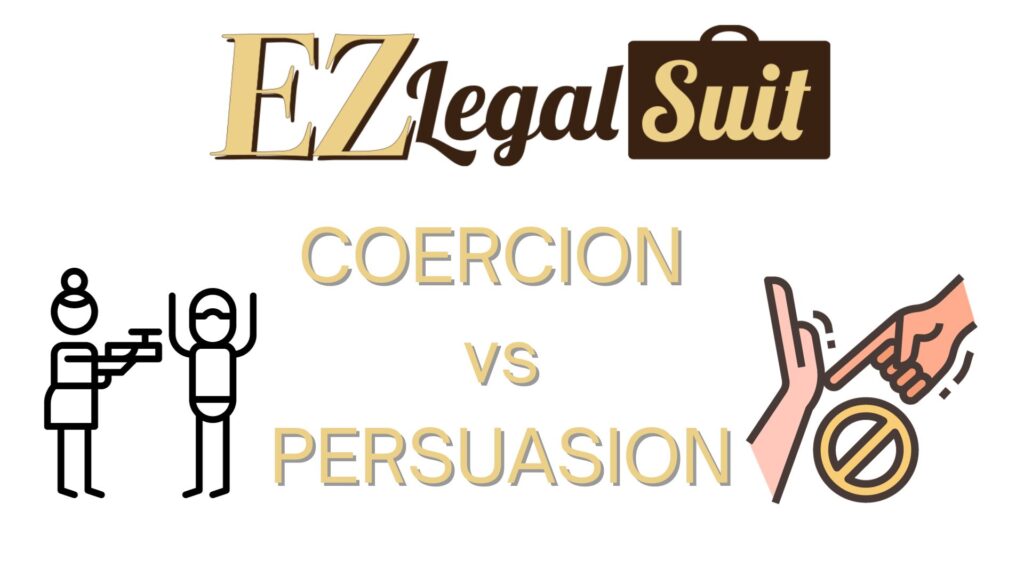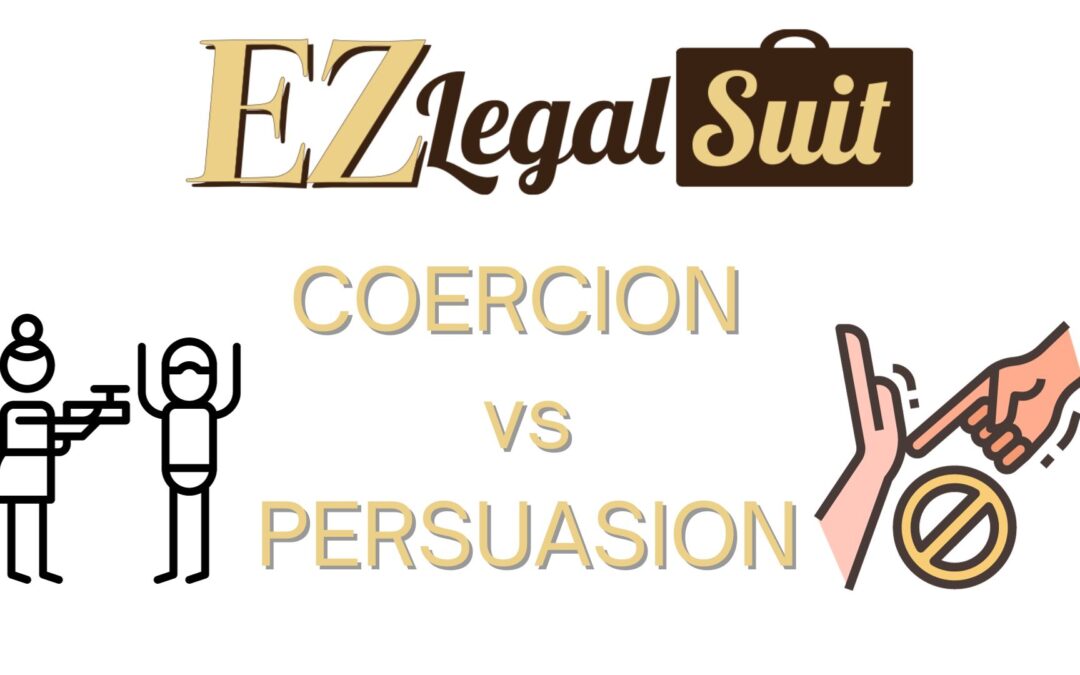
Coercion is illegal. For Good reason – it is a force that uses power, affecting the freewill of the person coerced. Persuasion is allowing the other person a choice.
I wrote this before looking up the definitions. People know what things mean.
The Definition of Coercion, defined by Webster, in plain common English meaning:
1 : to compel to an act or choice
was coerced into agreeing
abusers who coerce their victims into silence
2 : to achieve by force or threat
coerce compliance
coerce obedience
3 : to restrain or dominate by force
and Persuasion, or Persuade:
1 : to move by argument, entreaty, or expostulation to a belief, position, or course of action
2 : to plead with : urge
Crimes of Coercion
New Hampshire Coercion
631:9 Financial Exploitation of an Elderly, Disabled, or Impaired Adult. –
I. Whoever commits any of the following acts against an elderly, disabled, or impaired adult, as defined in RSA 631:8, shall be guilty of financial exploitation and penalized pursuant to RSA 631:10 if:
(a) In breach of a fiduciary obligation recognized in law, including pertinent regulations, contractual obligations, documented consent by a competent person, including, but not limited to, an agent under a durable power of attorney, guardian, conservator, or trustee, a person, knowingly or recklessly, for his or her own profit or advantage:
(1) Fails to use the real or personal property or other financial resources of the elderly, disabled, or impaired adult to provide food, clothing, shelter, health care, therapeutic conduct, or supervision for the elderly, disabled, or impaired adult when under a duty to do so; or
(2) Unless authorized by the instrument establishing fiduciary obligation, deprives, uses, manages, or takes either temporarily or permanently the real or personal property or other financial resources of the elderly, disabled, or impaired adult for the benefit of someone other than the elderly, disabled, or impaired adult; or
(b) In the absence of legal authority a person knowingly or recklessly through the use of undue influence, harassment, duress, force, compulsion, COERCION, or under any circumstances where the person knew that the elderly, disabled, or impaired adult lacked capacity to consent, or consciously disregarded a substantial and unjustifiable risk that the elderly, disabled, or impaired adult lacked capacity to consent:
UNIFORM FRAUDULENT TRANSFER ACT
Section 545-A:10
545-A:10 Supplementary Provisions. – Unless displaced by the provisions of this chapter, the principles of law and equity, including the law merchant and the law relating to principal and agent, estoppel, laches, fraud, misrepresentation, duress, COERCION, mistake, insolvency, or other validating or invalidating cause, supplement its provisions.
Source. 1987, 215:1, eff. Jan. 1, 1988.
CHAPTER 633
INTERFERENCE WITH FREEDOM
Section 633:5
633:5 Peonage. –
I. An actor is guilty of a class A misdemeanor if such person knowingly holds a victim in a condition of involuntary servitude in satisfaction of a debt owed to the actor. In this section, “involuntary servitude” means a condition of servitude in which the victim is forced to work for the actor by the use or threat of physical restraint or physical injury, or by the use or threat of COERCION through law or the legal process.
II. The use of the labor of any person incarcerated in a state or county correctional facility or municipal jail shall be exempt from this section.
Source. 2006, 237:1, eff. Jan. 1, 2007.
Federal Coercion
25 CFR § 11.406 – Criminal coercion.
§ 11.406 Criminal coercion.
(a) A person is guilty of criminal coercion if, with purpose to unlawfully restrict another’s freedom of action to his or her detriment, he or she threatens to:
(1) Commit any criminal offense; or
(2) Accuse anyone of a criminal offense; or
(3) Take or withhold action as an official, or cause an official to take or withhold action.
(b) Criminal coercion is classified as a misdemeanor.
42 U.S. Code § 3617 – Interference, coercion, or intimidation (Housing)
It shall be unlawful to coerce, intimidate, threaten, or interfere with any person in the exercise or enjoyment of, or on account of his having exercised or enjoyed, or on account of his having aided or encouraged any other person in the exercise or enjoyment of, any right granted or protected by section 3603, 3604, 3605, or 3606 of this title.
“provided in whole or in part with the aid of loans”


